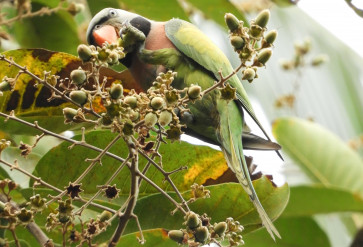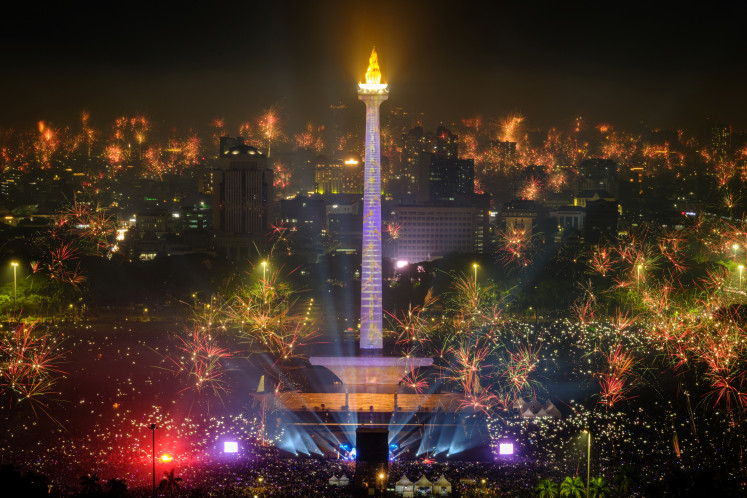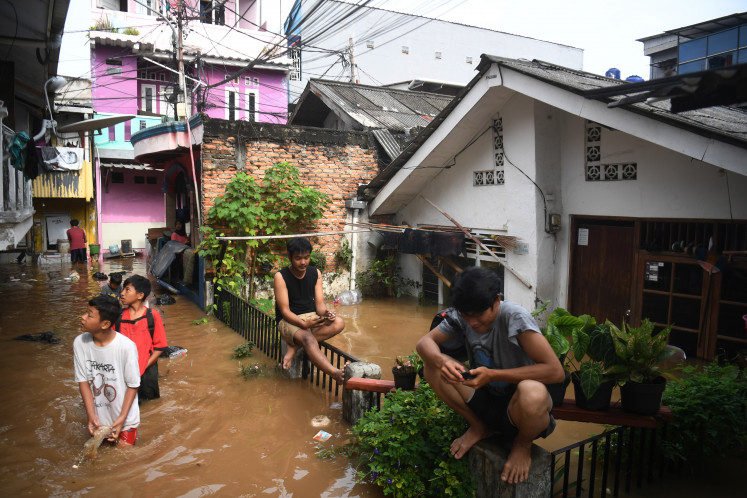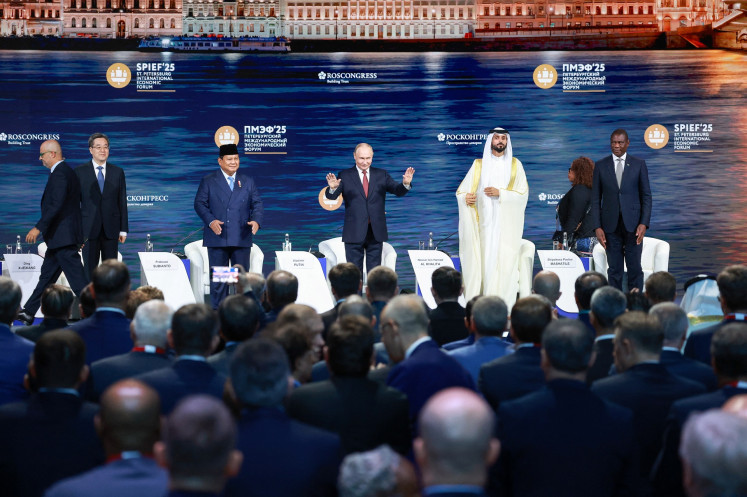Popular Reads
Top Results
Can't find what you're looking for?
View all search resultsPopular Reads
Top Results
Can't find what you're looking for?
View all search resultsSanaullah: A gentility of Pakistan
(JP/Ricky Yudhistira)Pakistan may be notorious in the eyes of many Indonesians who attribute it to Islamic extremism, but its ambassador shows that âthe soul of Pakistan is softâ
Change text size
Gift Premium Articles
to Anyone
 (JP/Ricky Yudhistira) (JP/Ricky Yudhistira)
(JP/Ricky Yudhistira) (JP/Ricky Yudhistira)
(JP/Ricky Yudhistira)
Pakistan may be notorious in the eyes of many Indonesians who attribute it to Islamic extremism, but its ambassador shows that 'the soul of Pakistan is soft'.
A refinement in the arts embodies the personality of outgoing Pakistani Ambassador Sanaullah ' cum poet, painter, sculptor and writer.
Furthermore, 'he is also one of few ambassadors with a humble personality,' commented a journalist. She was right. The 60-year-old ambassador didn't bother to stand up, approach and greet a late-coming journalist at his cozy farewell poetry reading get-together that he threw for a small number of friends at his residence recently.
His poetry has been translated into several languages, including Romanian, Ukrainian, French and Arabic in the form of six books.
In Indonesia, he published his poetry book Vault of Dreams that 'deals with the subject more in the tradition of sufi poets of the subcontinent,' wrote Endy M. Bayuni, The Jakarta Post's then chief editor, in the preface of the book printed in 2011.
'He is candid, reflective and interactive,' Endy furthermore said about Sanaullah's pieces, which are dedicated to his mother who 'recited sufi poetry to us, her children' and through which introduced him to the refined and moderate soul of Pakistani culture.
Besides having had written poetry books, several articles and commentaries on diplomacy in various newspapers, the husband of former Ambassador to Singapore Fauzia Mazhar Sana has also exhibited his paintings and is now pursuing sculpting as well.
Under his tenure, the Pakistan Embassy in Jakarta has held its first ever Sindhi Embroidery exhibition, film screening, music performance and has distributed DVDs of Pakistani music and fashion shows.
It is not easy representing a country often accused of being a hotbed of religious hard-line movement. He found it troublesome when pundits labeled persecution against the Ahmadiyah sect in Indonesia as 'Pakistanization'.
'[Our government] declared Ahmadiyah a separate sect [from Islam] in 1974, with the consequence that they can no longer use Islamic symbols, call their mosque's mosque, or use the Koran as their holy book. [But, as a minority] They [and other minority groups] are given representation in the government and jobs.'
'Pakistan is slightly different [from Indonesia, which embraces the pluralist ideology of the Pancasila]. We have an objective resolution that makes it very clear that nothing is acceptable if it contradicts the fundamentals of Islam, sunnah [words and deeds of the Prophet] and fiqh [Islamic jurisprudence]. Our first constitution stated that everything would be amended to make it in line with Islamic injunction.'
However, at the same time, he said that Pakistan had been a moderate country from the very beginning although it was created in the name of Islam. 'Believe me, whether its military dictators, civilian [government] or fragile civilian structure, everybody tries to maintain a moderate image.'
He pointed out the fact that Pakistan's biggest strategic relationship was with non-Muslim countries, China and the US. 'It reflects that religion does not determine the base and scale of our relationship.'
It was considered that Pakistan had backed the Taliban's rise to power in Afghanistan in the mid-1990s and influenced the hard-line movement in Indonesia.
'I would say that it was not from Pakistan, but from the remnants of Afghanistan. All the Muslims came to Afghanistan to fight in the name of Islam against the Soviet Union.'
'When the Soviet withdrew [in the 1980s], the US, which helped the fighters with guns and everything, left them. Some of them settled down [in Pakistan] and raised families. Pakistan continued to have 2.5 million Afghan refugees [since Soviet invasion in 1979] and for practical purposes they became Pakistanis. The transitional tribal society brought with them gun culture. For them, guns are an embellishment of their personality.'
Sanaullah asked Indonesians to also remember the 600 Pakistani soldiers' contributions to Indonesia's independence, when they were part of British forces in the fight against the colonial Dutch.
At that time, he said, many common Pakistanis also came to preach Islam. 'Many of them settled here, raised families and their offspring are now prosperous Indonesians in industry, education, etc.'
'Why don't you look [also] at how Pakistan has helped Indonesia exchange intelligence activity [in the form of working group on terrorism]. We returned to you [one of the most wanted terrorist masterminds] Umar Patek.'
He deplored that Pakistani leadership had yet to be successful in prosperity development: 'There have been some foreign elements that have forced them to not focus on economic development so much.'
'Our problem with terrorism is much deeper than what you [Indonesia] have suffered. You are able to come forward because you don't have [problematic] Afghanistan sitting on your body. You don't have a big country with which you fought wars sitting on your borders. And you are not close to the Middle East, which is still unstable.'
'Our strategic location sometimes works against us,' he said.
The father of two is set to retire on Sept. 12, marking the end of his 35-year diplomatic career, which has included serving as ambassador to Romania, Bulgaria and the Republic of Moldova.
Some milestones during his tenure include achieving a US$1.3 billion trade mark at present, with 38 percent enhanced Pakistani exports from $760 million in 2009; securing removal of the 12-year Indonesian ban on rice imports; the signing of a preferential trade agreement after six years of inconclusive negotiations; and a memorandum of understanding envisaging defense cooperation as well as the purchase of weapons, equipment and ammunition from Pakistan.
He will return to Pakistan to establish an art gallery where young people can learn 'the magical effect they can create,' and wanted to be remembered as committed ambassador.
In his poetry book for the Post he signed: 'Indonesian life will survive in my soul forever.'









